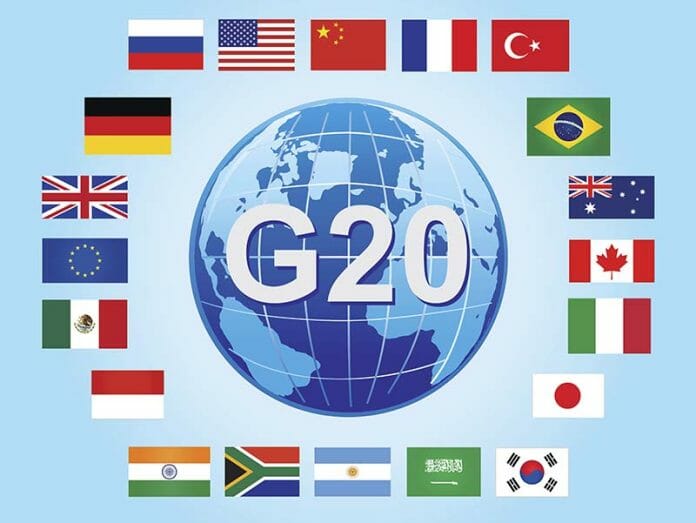China hopes the upcoming G20 Summit in Bali, Indonesia next month will play a constructive role in enhancing international cooperation against Covid-19, said Vice Minister of Foreign Affairs Ma Zhaoxu.
He said the country also hoped the summit, scheduled to take place from Nov 15 to 16 with the theme ‘Recover Together, Recover Stronger’, will promote world economic recovery and safeguard global food and energy security.
“As an important member of the G20, China has consistently taken an active part in international economic cooperation and global economic governance, and worked with other parties for the strong, sustainable, balanced and inclusive world.
“As for the Chinese leader’s participation at the summit, we will release relevant information in due course,” Bernama cited him saying at a press conference on the sidelines of the 20th National Communist Party of China (CPC) Congress in Beijing on Oct 18.
The G20 is a strategic multilateral platform connecting the world’s major developed and emerging economies, focusing on policy coordination in economics and development. It represents more than 80 percent of world’s GDP, 75 percent of international trade and 60 per cent of the world population.
The members of the G20 are Argentina, Australia, Brazil, Canada, China, France, Germany, India, Indonesia, Italy, Japan, Republic of Korea, Mexico, Russia, Saudi Arabia, South Africa, Turkey, the United Kingdom, the United States, and the European Union. Spain is also invited as a permanent guest.
China Skipping G20 Meeting Deeply Worrying
University of London’s Queen Mary Global Policy Institute Professor of International Economics Paola Subacchi asked will their private dinner reinforce progress, by enabling those who are new to the process – some participants will be meeting US President Joe Biden for the first time – to build relationships with G20 veterans?
Since the G20 became a leaders’ summit in 2008, the private dinner has become an invaluable platform for some of the world’s most powerful people to discuss, face to face, the most important issues that they and their countries are facing.
This year, there is no shortage of topics that will get the diners talking. The event’s host, Italian Prime Minister Mario Draghi, is keen to discuss the humanitarian and geopolitical situation in Afghanistan; in fact, he recently chaired an extraordinary meeting of G20 leaders on the topic.
The imperative of delivering vaccine doses to low-income countries is also likely to come up – about 23 billion doses to treat the Covid-19 pandemic is still needed, and this requires coordinated effort and open trade for vaccine supply chains.
And perhaps guests will consider some form of energy coordination, aimed at easing supply bottlenecks and reducing price pressures.
Strained Relationships
The US and China are barely on speaking terms, and Russia is highly unpredictable. Turkey’s recent threat to expel 10 ambassadors, including four from G20 member states – and the fact that Draghi called Turkish President Recep Tayyip Erdogan “a dictator” – has created further tension.
Finding common ground and making the event more pleasant than not for its participants is essential if the G20 is to remain an effective multilateral forum.
Fortunately, Draghi is well practiced at navigating competing demands and interests – a proficiency he honed during his tenure as European Central Bank President and is demonstrating now at the helm of Italy’s coalition government.
To keep disagreements from getting out of hand at the G20 dinner, Draghi will most likely attempt to identify low-hanging fruit – areas of common interest, where coordinated action is most likely.
A Reluctant China
Chinese President Xi Jinping’s decision not to attend the summit could help in this regard. There is precedent for this: In 2009, Xi’s predecessor turned down an invitation to attend another Italian-hosted summit, the G8 in L’Aquila, where China would have been a “guest” rather than an equal.
Russian President Vladimir Putin will not attend the proceedings in Rome, either.
But, while China’s decision not to attend the G20 summit could facilitate agreement, it is deeply worrying. Clearly, Xi no longer feels comfortable participating in a relatively small and unstructured multilateral gathering, such as the G20.
He would rather miss a valuable opportunity to meet with other world leaders, especially Biden, than risk being ambushed and disrespected. Donald Trump’s brand of “China bashing” has left deep scars.
In fact, nowadays China seems less interested in multilateral engagement more broadly. It used to participate actively in multilateral initiatives, especially on finance and fiscal policy, opined Subacchi.
But cooperation is now particularly difficult in these areas, and throughout Italy’s G20 presidency, China has seemed to lack much motivation to try.
This is a serious problem. We cannot end the COVID-19 pandemic, address the escalating climate crisis or ease the energy supply emergency that is threatening to derail the global economic recovery without China – specifically, without a China that contributes actively and positively to the G20.
Coaxing China Back
Other G20 powers must coax China back, with the US, in particular, adopting a more conciliatory stance. That doesn’t mean acquiescing to China’s every interest or preference.
Rather, it means accommodating China’s changing needs, where possible, as it undergoes a complex and gradual economic and social transition. It also means giving China credit when and where credit is due.
And China has made some effort. One of the success stories of Italy’s G20 presidency is China’s membership in the Common Framework for Debt Treatments, endorsed last November, to support low-income countries with unsustainable debts.
Last month, 12 countries formed the first creditor committee, with China as co-chair, to initiate negotiations with Ethiopia, which, along with Chad and Zambia, applied for debt treatment. Most of these countries’ debts are owed to private or Chinese creditors.









